FRAGRANT THOUGHTS – Have you ever thought about fragrance and wine pairings?
The two great elixirs that have charmed the human spirit since the beginning of history are fragrance and wine.
The famous Hermés perfumer Jean-Claude Ellena says in his book ‘Perfume: The Alchemy of Scent’: “Perfume is a story in odors, sometimes a poetry of memory”. Wine, too, has a distinct odor, a fragrance that is embedded in our memory.
One of the things you learn in wine education is the value of scent and the ability to smell. Fragrance is part of my daily routine. If I don’t wear it, I feel something is missing. But have you heard of the ‘no perfume in the tasting room’ rule? It exists because scent can interfere with the taste of wine.
The senses are more connected than we realize; the subtle notes in wines can be picked up through both taste and smell.
Let me help you now perfect your Portuguese wine choice with fragrance pairing; to complement the flavor of every glass with a signature scent.
I am happy to share that the December issue of the Algarve Plus Magazine has already been published with my new article about fragrance and Portuguese wine pairings!
The magazine is readable online or downloaded for free here.
Or read here the whole article:
Fragrant thoughts
The famous Hermès perfumer Jean-Claude Ellena says in his book (Perfume: The Alchemy of Scent): “Perfume is a story in odors, sometimes a poetry of memory.” The term ‘odor’ is similar in the world of wine. Every wine has a distinct odor that is embedded in our memory.
The two great elixirs that have charmed the human spirit since the beginning of history are fragrance and wine.
One of the things you learn in wine education is the value of scent and the ability to smell. The fragrance is part of my daily routine. If I don’t wear it, I feel something is missing. The scent gives me comfort and it calms me every time I smell it.
But, have you ever heard about the ‘no perfume in the tasting room’ rule? That’s because scent can interfere with the taste of wine.
Imagine yourself sitting at the bar. You give the wine in the glass a swirl and take a smell. Then, smell the perfume on your skin. Now take a sip of the wine. The nuances open up as you experience the scent of the perfume and the delicious taste of the wine in the glass. But how does someone come up with this? Does wine-scent perfume exist?
First of all, it’s good to know that there are some rules to wearing fragrance incognito. First, avoid anything too floral. All honeysuckle and tuberose scents are too powerful. Vanilla can be too sweet. A powdery jasmine and iris can be worn, but only if they’re not applied to pulse points, and just one spritz.
Wine is similar to the personal fragrance. It all starts with the nose. In wine, the nose guides our initial thoughts on whether to take the first sip and then several more. The world of wines is a fascinatingly fragrant one and wine lovers will always seek out singular attributes in every bottle. I myself have been studying aromas for more than a decade in the shops and also on marketplaces, which has helped in wine tasting and has been useful in understanding wine faults.
The fragrance is the same. At first whiff, we determine whether we like it, or if it’s too floral, musky, heavy, or soft. It’s an emotional connection.
In wine, we not only study where the grapes were grown, but how they were picked, pressed, aged, and stored.
Although wine is just pure grape, when brought alive through the meticulous process of fermentation, it naturally emits exhilarating bouquets of various fragrances and flavors that often show intriguing similarities with perfume.
Fine wines and exotic fragrances share some very fascinating attributes, in equal measure. Both showcase a bewildering range of striking and subtle bouquets and distinct flavors. And the Premium wines, with their unmistakable repertoire of fragrances, palates and aromas, are likened to distinguished scents and perfumes that display equal olfactory sensations.
Did you know that it is possible to use wine and liqueur notes in certain perfumes? When we enjoy a cocktail or savor fine wine, part of the enjoyment lies in the aroma. The smell is an important component of taste, which may explain why cocktail culture has seeped into the perfume world and purveyors of liqueur and wine have entered the perfume business.
For today’s purveyors of wine and spirits, perfume is just another channel to promote their brand. Perfumes position the company in a luxury sector, of exigency and quality of French style that they are also in through their wines.
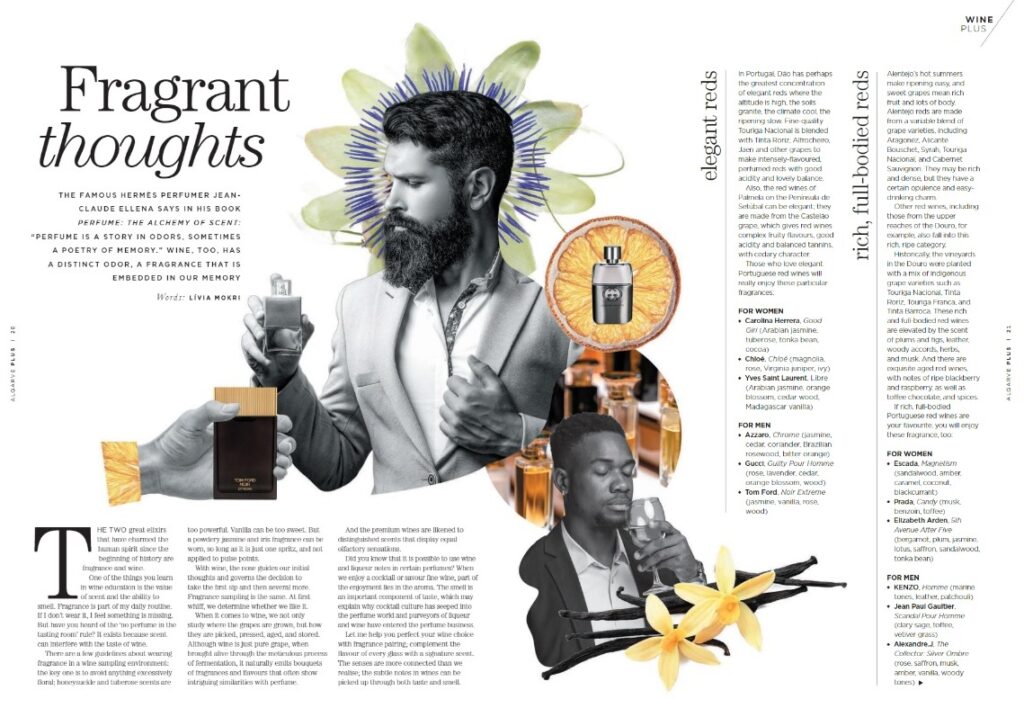
The rule I mentioned above inspired many wine and fragrance experts, to figure out a way to pair perfume with wine to help us experience life’s sweet little details through fragrance. You can further match these pairings with certain events since it will be easy to surprise your loved one with the right perfume for Christmas based on their favorite wine.
So, let me help you perfect your wine choice with fragrance pairing! Complement the flavor of every glass of wine with the signature scents. The senses are more connected than we realize; the subtle notes in wines can be picked up through both taste and smell.
ELEGANT REDS
In Portugal, Dão has perhaps the greatest concentration of elegant reds where the altitude is high, the soils granite, the climate cool, ripening slow. Fine-quality Touriga Nacional is blended with Tinta Roriz, Alfrocheiro, Jaen, and other grapes to make intensely flavored, perfumed reds with good acidity and lovely balance. Also, the red wines of Palmela on the Península de Setúbal can be elegant, made from the Castelão grape, which gives red wines with complex, fruity flavors, good acidity, and balanced tannins, with cedary character.
Those who love elegant Portuguese red wines will like the following fragrances as well:
For women:
- Carolina Herrera – Good Girl (Arabian jasmine, tuberose, tonka bean, cocoa)
- Chloé – Chloé (magnolia, rose, Virginia juniper, ivy)
- Yves Saint Laurent – Libre (Arabian jasmine, orange blossom, cedar wood, Madagascar vanilla)
For men:
- Azzaro – Chrome (jasmine, cedar, coriander, Brazilian rosewood, bitter orange)
- Gucci – Guilty Pour Homme (rose, lavender, cedar, orange bloom, wood)
- Tom Ford – Noir Extreme (jasmine, vanilla, rose, wood)
RICH, FULL-BODIED REDS
Alentejo’s hot summers make ripening easy, and sweet grapes mean rich fruit and lots of body. Alentejo reds are made from a variable blend of grape varieties, including Aragonez, Alicante Bouschet, Syrah, Touriga Nacional, and Cabernet Sauvignon. They may be rich, dense, and oak-aged, but still with a certain opulence and easy-drinking charm. Occasional other red wines from elsewhere in Portugal also fall into this rich, ripe style, from the upper reaches of the Douro, for example.
Historically the vineyards in the Douro were planted with a mix of indigenous grape varieties such as Touriga Nacional, Tinta Roriz, Touriga Franca, and Tinta Barroca. These rich and full-bodied red wines are elevated by the scent of plums and figs, leather, woody accords, herbs, and musk. Exquisite aged red wines, with notes of ripe blackberry, and raspberry, as well as coffee, toffee, chocolate, and spices, as well.
Those who love rich, full-bodied Portuguese red wines will like the following fragrances as well:
For women:
- Escada – Magnetism (sandalwood, amber, caramel, coconut, blackcurrant)
- Prada – Candy (musk, benzoin, toffee)
- Elizabeth Arden – 5th Avenue After Five (bergamot, plum, jasmine, lotus, saffron, sandalwood, tonka bean)
For men:
- KENZO – Homme (marine tones, leather, patchouli)
- Jean Paul Gaultier – Scandal Pour Homme (clary sage, toffee, vetiver grass)
- Alexandre.J – The Collector: Silver Ombre (rose, saffron, musk, amber, vanilla, woody tones)
FRUITY ROSÉS
The Portuguese rosé wines could be crisp, fruity, and light with lower alcohol and lighter body when grown in cooler places which means places with maritime influence or high altitude. There’s not really a particular region in Portugal that is famous for making rosés. Every imaginable red grape, national and international, is made into rosé. These wines present aromas of various red fruits, currants, strawberries, blackberries, and ripe raspberries. Rosé comes to life when paired with delicate flavors of rose and sweet fruits, with an aftertaste of blackberry preserves.
Those who love Portuguese fruity rosé wines will like the following fragrances as well:
For women:
- Lancôme – La Vie Est Belle (blackcurrant, pear, jasmine, rose petals, orange blossom, vanilla, praline)
- Hugo Boss – BOSS Alive (apple, cinnamon, blackcurrant, plum, Indian jasmine, Madagascar vanilla, cedar)
- Guerlain – Insolence (berry, violet, rose petal, orange blossom)
For men:
- Jimmy Choo – Urban Hero Gold (pineapple, blood orange, tonka bean, lavender, sandalwood)
- Bond No. 9 – New York Beaches Liberty Island (blackcurrant, bergamot, orange, bitter orange, jasmine, marshmallow)
- Guess – Seductive Homme Red (cinnamon, lemon peel, figs, orange blossom, amber, vanilla, sandalwood)
LIGHT, REFRESHING WHITES
This unique style of white wine with the lowest alcohol and high, fresh acidity comes from Vinho Verde, the cool, hilly, verdant northwest of Portugal. Many also have a slight prickle of fizz, once a remnant of the carbon dioxide of fermentation, now often added at bottling time. These wines may be made from numerous grape varieties, but the greatest ones are the Alvarinho and Loureiro.
Alvarinho is a particularly acidic grape, with certain varieties even possessing a degree of salinity. This comes from the grapes’ close proximity to the Atlantic Ocean. Alvarinho presents notes of lemon, peach, passion fruit, lychee, orange peel, and jasmine.
Loureiro is the second-most produced grape in the Vinho Verde region. Its name comes from ‘louro’. This is due to the distinctive aroma given off. Loureiro grape gives orange blossom, apple, peach, and linden notes to the wine.
Those who love light, refreshing Portuguese white wines will like the following fragrances as well:
For women:
- Nina Ricci – Nina Fleur (green apple, lemon, orange blossom, cedar)
- Burberry – My Burberry Blush (lemon, pomegranate, rose, green apple, jasmine, lilac acacia)
- Guerlain – La Petite Robe Noire (jasmine, rose, apple, cherry, orange blossom, white amber)
For men:
- Hermés – Colognes Collection Eau de Citron Noir (citrus)
- Alexandre.J – The Collector: Mandarine Sultane (lemon, bergamot, orange, almond, peach, orange blossom, jasmine, bitter orange)
- Tiziana Terenzi Halley (passion flower, black currant, rose, lemon, vanilla, woody tones, amber)
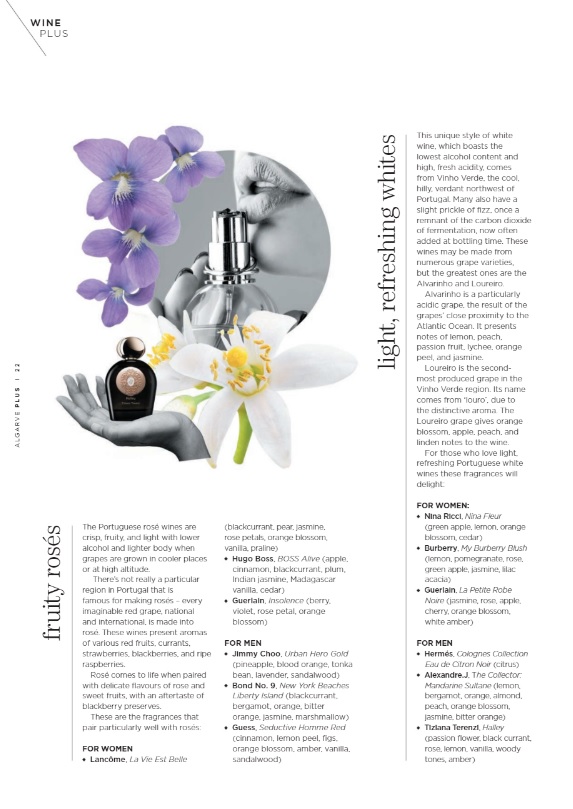
And you? What style of wine is your favorite? And what kind of fragrance will you buy for your loved one? Let me know in a comment below!

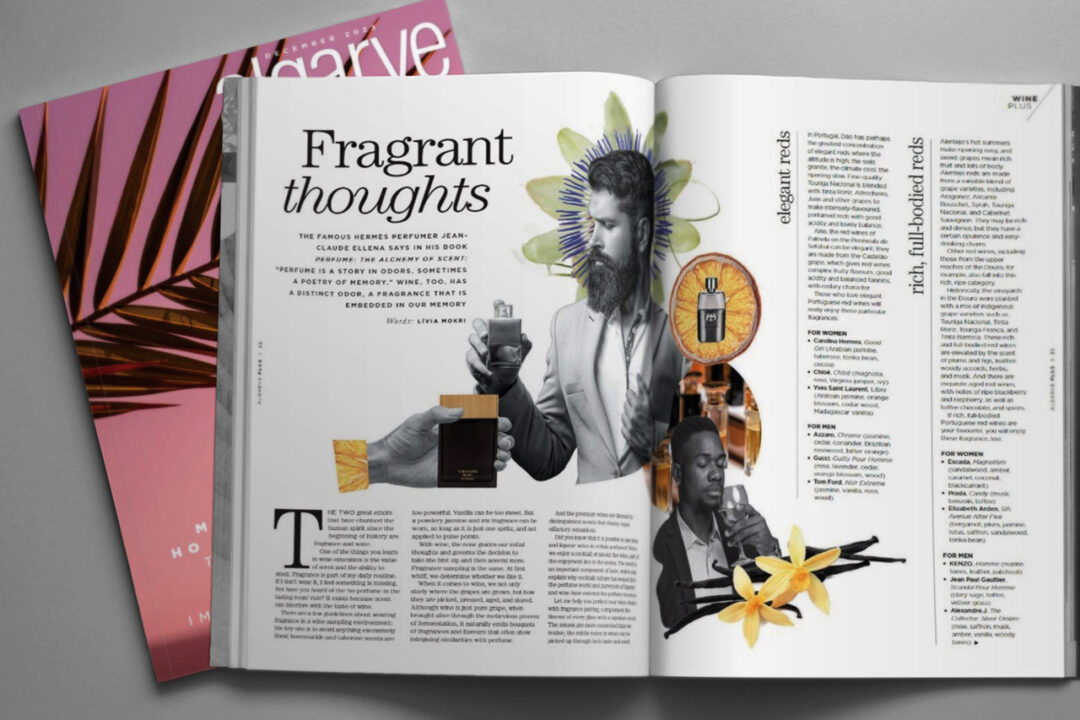
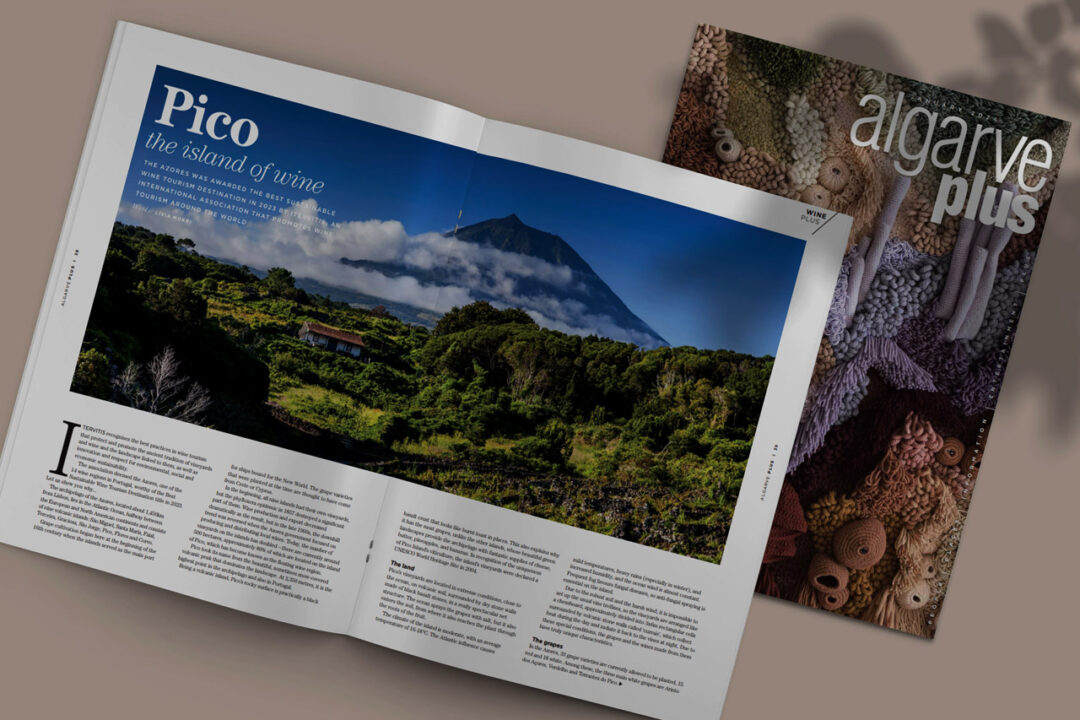
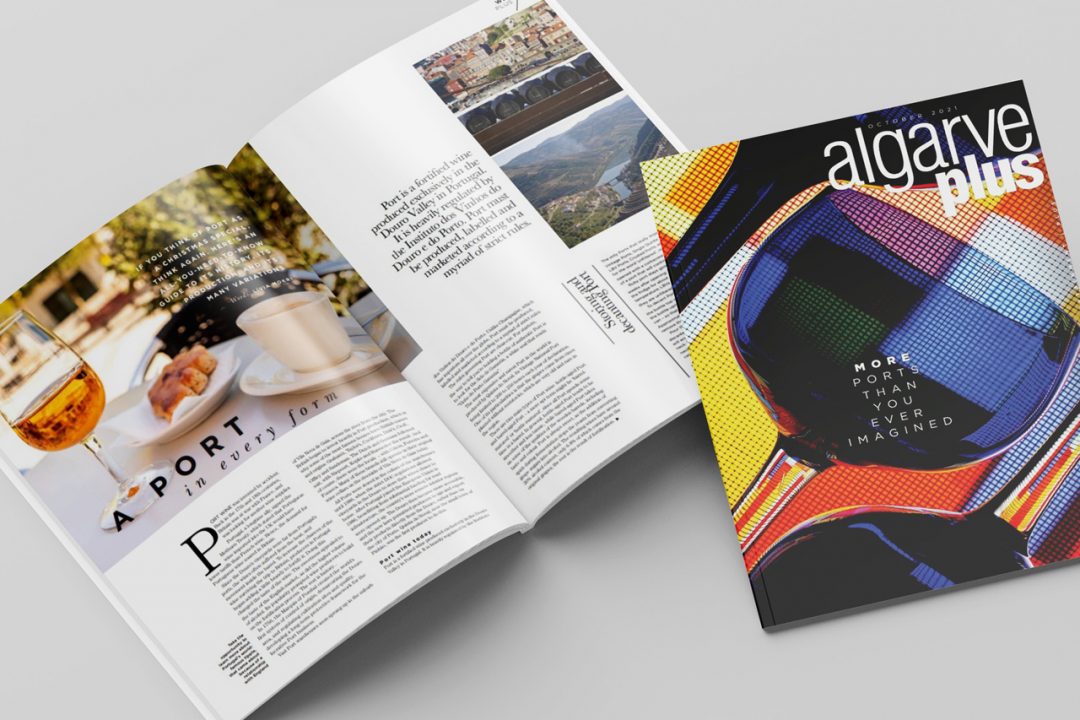
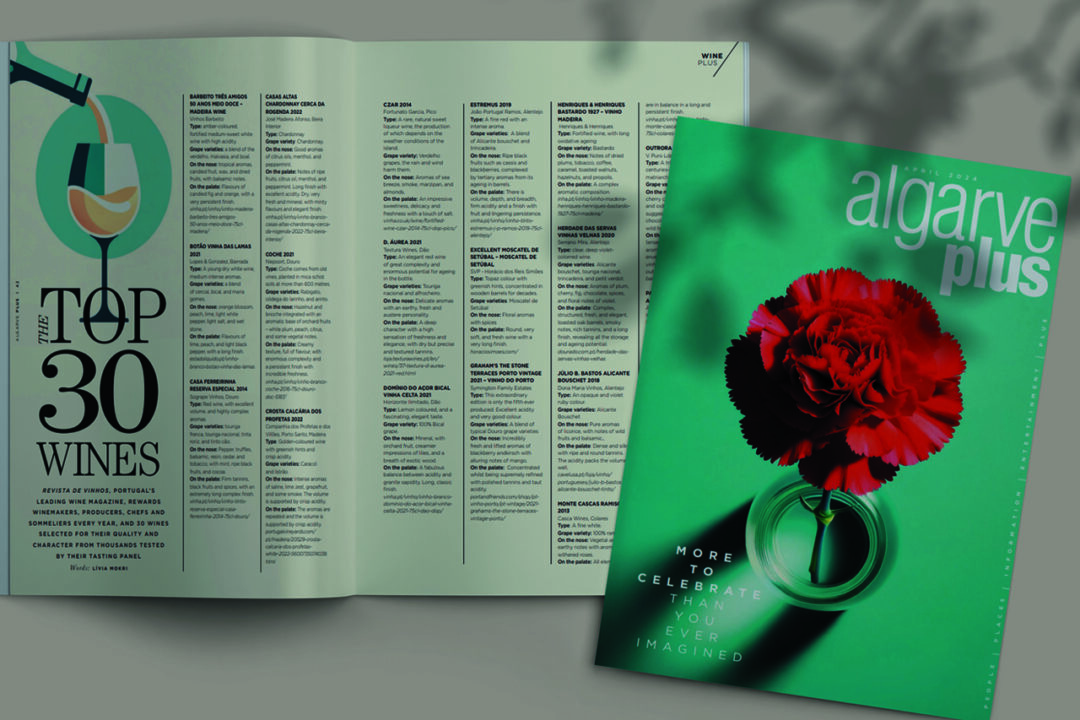

No Comments Found